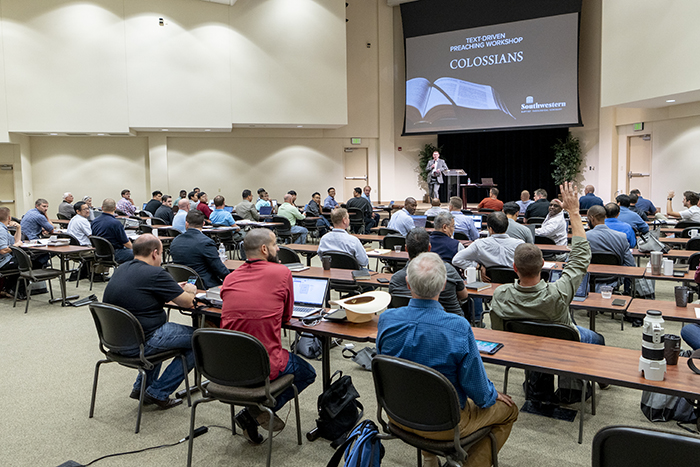Preaching workshop provides tools for text-driven sermons on Colossians

Southwestern Baptist Theological Seminary’s Text-Driven Preaching Workshop, Oct. 7, offered pastors, teachers, and church leaders the tools to effectively preach text-driven sermons on the book of Colossians and its message of faith, hope, and love. The workshop was conducted by Southwestern Seminary’s School of Preaching faculty.
David Allen, dean of the School of Preaching, opened the day-long workshop, urging preachers to break Colossians down by related paragraphs to organize a sermon, rather than tackling it verse by verse. “That is genuine expository preaching, semantically, through the paragraphs in the Bible,” Allen explained. “That’s what we’re after.”
Colossians 1 naturally divides itself into six sermons when organized this way, Allen said. “You can preach an entire series if you want to.”
Allen encouraged sermon writers to keep the study Bibles of William Barclay or the works of F.F. Bruce in their library, to explore used book stores for suitable additions whenever possible, and to be certain that sermons are clear and straightforward.
“A mist in the pulpit creates a fog in the pew,” Allen said. “If you believe in text-driven preaching, you let the Bible drive your sermons.”
Deron Biles, professor of preaching and pastoral ministry, led the second session, covering Colossians 2.
“Paul uses the word agon, the Greek word for agony,” Biles said in reference to verse 1. “In our English interpretation of agony, you see it in a negative connotation. But in the New Testament, it indicates a struggle to fight the good fight.”
Biles summarized Paul’s message: “I want you to know how greatly I am struggling for you. I may be absent in body, but I’ll be with you in spirit.”
“We need more struggle in the church,” Biles continued. “Struggle for encouragement. Struggle for unity. Struggle for assurance. Struggle for discernment. Struggle for discipleship. You’ll rejoice as Paul did when you’re walking in step, and steadfast, growing steady in your faith.”
During the following session on Colossians 3, Professor of Preaching Matthew McKellar presented a key theme of the passage: “set your mind on things above.”
Analyzing the passage’s implications for the Christian life, McKellar first asked, “What is it to be a Christian?” Scripture’s answer, McKellar continued, is to be in union with Christ and to be hidden in Him.
From the outset of the chapter, Paul says to “seek the things above.” Essentially, McKellar said, “don’t look in; don’t look around. The first place you look is up.”
A holy life, McKellar said, is not lived by one’s own strength, but “by a steady and focused gaze on Jesus Christ.”
McKellar recognized the challenge of this calling, but argued that the challenge is more reason why preachers must never neglect Christ in their sermons.
“I think one of the problems in a lot of modern preaching today is that it’s got too much of us, it’s got too much of events, it’s got too much of people, it’s got too much of everything, but not enough of Christ,” McKellar said.
McKellar urged preachers to point their congregations to Christ each and every time they gather. To do so, he said, is one of the most practical things they can do in their preaching to encourage their people to live life with an eternal perspective.
“So I need to pursue those things that belong to the heavenly realm where Christ currently reigns,” McKellar said. “They can think more about Jesus, they can think more about heaven, and they can cultivate an eternal perspective. That is not going to happen unless they are consistently saturated in God’s Word and are sitting under the teaching and preaching of God’s Word.”
Barry McCarty, professor of preaching and rhetoric, concluded the workshop by exploring how to preach Colossians 4. He broke the chapter into three sections and presented a sample sermon outline for each: “Praying with Power” on verses 2-4, “A Wise Walk and a Gracious Talk” on verses 5-6, and “I Get by With a Little Help from My Friends” on verses 7-18.
In the first sermon, McCarty highlighted the need to be a “spiritual overwatch” who prays for others.
“Whose spiritual overwatch are you?” McCarty asked. “Because you have some people in your life—family, friends, neighbors, folks you know—who aren’t spiritually healthy enough to pray for themselves. In fact, you know some lost people who don’t have a clue about praying for themselves.
“And can you, continuing steadfastly in prayer, perhaps be called right now to be the spiritual overwatch for a lost person who needs to come to Christ? You bet you could.”
For the third sermon, McCarty noted that “in this seemingly ordinary list of names, Paul’s friends teach us some lessons on how we can be of service to Christ.” The list included, among others, someone who had a servant’s heart, someone who overcame a sinful past, and someone who took great risks.
Regarding Paul’s instruction in verse 16 to have this letter read not only in the church at Colossae, but also in Laodicea, McCarty said, “The whole reason that this book is in your New Testament is that the Holy Spirit intended for you to read it as well. And so every time we open the Scriptures, someone has some reading to do; someone has some living to do.”
McCarty concluded his session, and the workshop as a whole, with the reminder that “one of the things that a sermon ought to do is to help people read their Bibles better.” He continued, “And I hope you’ll do that as a pastor; I hope you’ll preach in such a way that you unpack the substance, the structure, and the spirit of every text, that not only will people hear the particular content of your sermon, but that by watching how you preach and how you teach and how you do what you do with the text, you will show them how to read their own Bibles better.”
To learn more about text-driven preaching and to keep up with all the School of Preaching events, visit PreachingSource.com.



